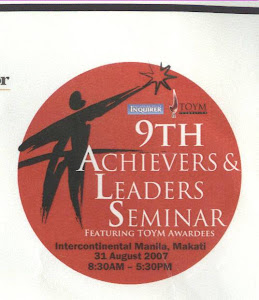Teaching is a dialogue. Students learn from teachers. And teachers learn from students. Otherwise, there is no teaching. But sometimes you get surprised with what you learn from your students. I did. And I was horrified.
Years back, I innocently required my Nursing students -probably all of whom wanted to work abroad after graduation- in our Philippine Government and Constitution subject to come up with a paper about Politics in the Hospital. This means telling stories about their experiences during hospital duty which they consider as "political."
Of course we had to define first what politics is. Well, I got all the answers related to politics. But I summarized its definition to its simplest nature which is "the ability of A to make B do something which B would not have otherwise done." Sounds clear enough. But I wanted the concept not just to be defined by them but to let the concept eventually sink down their head and heart (even after taking this subject) and perhaps influence them to decide to help our country first rather than work abroad after graduation. Here were some of their stories:
1. There was 1 baby patient who was looked after by her mother and her 12-year old brother in the Pediatric Ward. Hungry, the mother decided to have her younger son to buy them food. Having bought food outside the hospital, because the hospital canteen was already closed and food was much cheaper, the boy went outside the hospital. He, however, never returned to their ward because Visiting Hours was over. The security guard gave the food to the mother but disallowed the boy to enter the hospital.
2. A patient suffering from pain from his pelvis and downwards was admitted in the hospital. Not knowing yet the cause of his pain, the doctor told the wife to make the patient to undergo several tests. Upon knowing the amount of 1 ultrasound, which was P9,000, the wife decided not to have this. Because no payment was made, no ultrasound was taken. Nurses were described to be texting and laughing away their time. Next day, the patient died.
3. One patient was going into shock. Horrified, although disallowed, the student-nurses wanted to perform CPR to revive the patient. When the students informed the nurses on duty about this they were told that the patient's relative already signed some papers stating that DNR will be performed. So what's DNR? DO NOT RESUSCITATE! That's because the patient does not have the means to pay for their bills.
4. A statistic supposedly observed in the hospital is 1 syringe = 1 patient. Out of poverty, or for some other reason this hospital practice is to use 1 syringe for 2-3 patients.
5. Another poor patient was admitted in the hospital. An external fixator was placed in him to keep his broken bones intact. This device, however, has to be removed. Without the money to buy anaesthesia, the fixator was removed - just like that, without the anaesthesia.
Horrified? Who wouldn't be? Did I learn? Yes, and I did painfully. After reading all the papers my students submitted I thought - maybe thinking about them not working abroad is too far enough to be given a thought. Some form of "debriefing" for the students would have helped them understand better the horrors in the hospital. But is this available? Not really. About 2 years ago, government only allotted about 35 centavos for the healthcare of 1 Filipino citizen.
Subscribe to:
Post Comments (Atom)
.jpg)

.jpg)
No comments:
Post a Comment